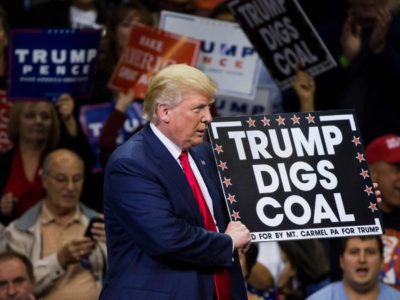Turnabout is Fair Play
The same tools that have been used to stymie the Obama Administration can be turned against Trump.
Conservatives and industry have perfected some legal tools to block regulation by the Obama Administration. Those tools can be turned against them, by using the same tools to block anti-regulatory moves by the Trump Administration. As a professor, I don’t necessarily agree with all of them. But as a lawyer, I wouldn’t hesitate to use them on behalf of my client.
Here are some illustrations.
1.Cost-Benefit Analysis. Many environmentalists loathe cost-benefit analysis. But, as Richard Revesz and Michael Livermore have been arguing for years, cost-benefit analysis can also provide a basis for environmentalist arguments. The Trump Administration is likely to be very sloppy in its economic analysis. It should be easy to poke big holes in their analysis, undermining their arguments for new rules and complicating the path to deregulation.
2. Data Quality Act. This obscure statute requires the White House to issue regulations to ensure the objectivity and accuracy of data used by agencies. Agencies have to establish “administrative mechanisms allowing affected persons to seek and obtain correction of information maintained and disseminated by the agency that does not comply with the OMB guidelines.” The Trump Administration is sure to play fast-and-loose with science, up to and including climate change denial. As Holly Doremus also recently pointed out, this statute provides one mechanism for challenging those distortions.
3.Nationwide Injunctions.. Conservatives and industry brought suits in friendly district courts to get nationwide injunctions against Obama policies like immigration reform. They also got the courts to classify some changes as “rules” rather than changes in enforcement policy. Environmentalists can follow their lead.
4.Standing for States Based on Indirect Financial Impacts. Texas got standing to challenge immigration reform on the theory that it would have to spend money to issue driver’s licenses to undocumented immigrants. The Texas case was particularly striking since it could have avoided the injury just by changing its own laws about drivers licenses. States that favor regulation or protection of natural resources can exploit this standing argument in case where actual environmental damage can’t be proved.
5.Challenging “Guidelines” and “Enforcement Policies” as Invalid Substantive Rules. This is another successful tactic by conservatives and industry; just as usable by environmentalists against the Trump Administration as by the other side against the Obama Administration.
6.Stays of Administrative Actions. Getting stays pending litigation is another successful tactic by the other side. As long as their venues with sympathetic judges, this is a game that environmentalists can play too.
There’s some risk that utilizing these mechanisms could help legitimate them, and in the long run this could be bad for environmental regulation. But the Trump Administration is anywhere near as bad as we now expect, the urgent need of blocking anti-environmental decisions may outweigh the long-term costs.
In short, what’s sauce for the goose is sauce for the gander.
Reader Comments
4 Replies to “Turnabout is Fair Play”
Comments are closed.







There are also limits to the reach of the Commerce Clause (e.g. gun control cases) and limits to federal preemption in areas where the states have traditional police powers. Successful resolution of these issues and those in your post depends on judges who respect the rule of law, and I figure it will take the Trump administration a few years to fill the Federal bench with people who don’t.
Another tool that occurs to me is FACA (Federal Advisory Committee Act). It requires that formalities such as Federal Register notice of meetings, agendas, and meeting minutes be observed for advisory groups used by the Federal government, including those used by the President. Advisory groups must also receive prior charters before they begin operating. Trump has already announced the formation of such groups, filled with Wall Streeters, to advise him, I doubt he’s heard of FACA, much less observed the requirements. FACA violations can be litigated.
We don’t need new rules to stop the Clean Power Plan instead we rely on good and accurate data to support curtailment of climate rules. Gimmicks such as injunctions, indirect impacts and administrative actions may delay curtailment but are unlikely to stop this process. But that’s okay, bring it on. Let the backlash begin. Stomp Trump!!!
As you say: “There’s some risk that utilizing these mechanisms could help legitimate them, and in the long run this could be bad for environmental regulation.”
Have we been reduced to using the same unethical methods that conservatives and industry who are subservient to the power of money use, even when their actions are at the risk of producing grave harm to the the long-term future of the human race?
Or is subservience to the power of money really wired into all of our brains, otherwise why have intellectuals continuously failed to produce and implement solutions by now? A worst case scenario is the fact that Edward Teller had a solution, fusion powered power production by the end of the 20th century, but the establishment marginalized even him because of the power of money and the military-industrial complex that Ike warned us about.
When are we going to learn to communicate with, educate and motivate We The People, which is what democracy and education are supposed to enable us to do, so they will demand the right solutions to perpetuate an acceptable long-term quality of life for our newest generations before it is too late to protect them.
It seems like we really don’t know what the hell we are doing?